10.12.16
Posted in Europe, Patents at 6:59 am by Dr. Roy Schestowitz
Kongstad’s mansion of horror
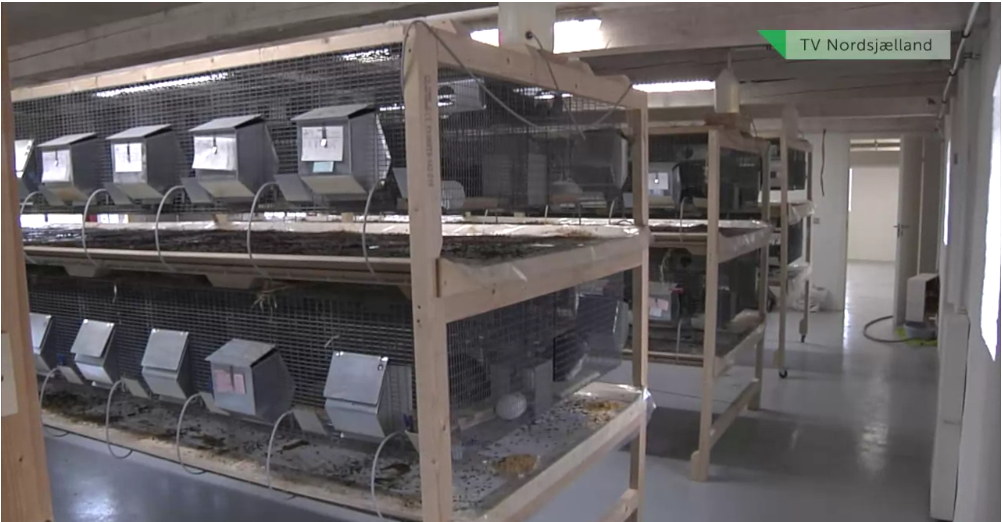
See "Controversial Chinchilla Farming by the Kongstad Family" for more such photos
Summary: The (international) political aspect of the fur industry and Kopenhagen Fur in particular, as covered by the media
WHILE researching for our latest long post that implicates a very high EPO figure we came across more evidence that shows the degree to which politics play a role in the systematic killing of tens of millions of small animals for their skin.
We did, for example, come across this stuff about the political influence of the fur industry in Israel. It seems that the international fur industry got heavily involved in efforts to stop the Israeli parliament passing a bill to ban the trade of mink and fox skins in Israel.
According to reports, Kopenhagen Fur played a key role in this. There’s an article about the affair here. As a reminder, there’s a link between Kopenhagen Fur and the Chairman of the Administrative Council of the EPO.
There are also some more detailed articles on Ha’aretz but they are subscription only. See “Report: Israeli Lawmakers Shelved Fur Ban After Taking Funded Trip to Denmark“
Summary: “Channel 1 report alleges that four MKs visited Copenhagen on International Fur Trade Federation’s dime.”
Read more in “Denmark, Israel and the Deathly Stench of Fur“
“It has become impossible to speak about the EPO without speaking about politics. Eponia does not exist in a vacuum.”Summary: “From 2009-2014, the world’s major fur associations – Denmark makes about $2 billion a year from the industry – waged an expensive battle to quash the Knesset bill to ban the trade of mink and fox skins in Israel.”
How many other countries has that happened in? Apropos payments for policy, see our article "Some Details About How the EPO’s President is Rumoured to be ‘Buying’ Votes and Why It’s Grounds/Basis for “Immediate Dismissal”" (published in May).
It has become impossible to speak about the EPO without speaking about politics. Eponia does not exist in a vacuum. █
Permalink
 Send this to a friend
Send this to a friend
Posted in Europe, Patents at 6:38 am by Dr. Roy Schestowitz
Danish fairy tales are no fairy tales but horror stories
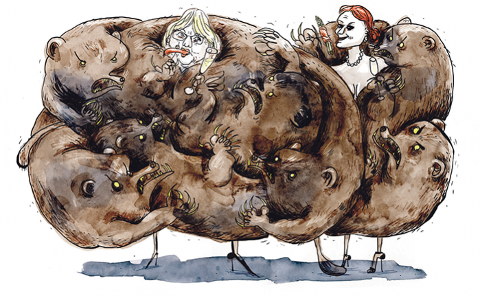
Summary: Bremelandsgård has turned from a villa into a chinchillas slaughtering operation, owing to Jesper Kongstad’s fur farming venture
ARTICLES AND ADDENDA in this series about the business ventures of Jesper Kongstad, Chairman of the Administrative Council of the EPO, have so far included the following ten posts (plus some new gem from last night):
These ten previous parts of the series have attracted some interest from local media and EPO insiders. An EPO insider, for example, posted the following tweet (with newly-added photos) when our series started.
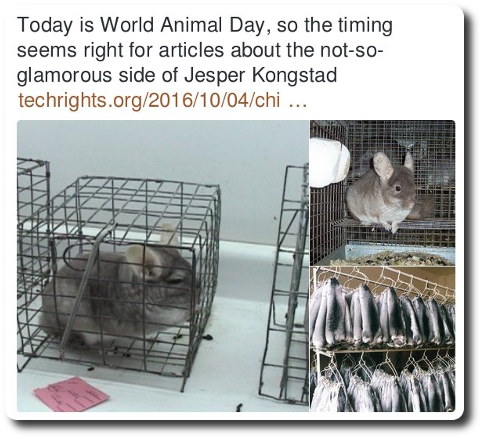
The chinchillas angle attracted the most attention because of the animal cruelty element of it. The sad thing is, the super-rich probably lack the empathy to even understand why it’s immoral. They grow animals not for food or for leisure but for skin, as “fur” can imply something like wool (shaving it off rather than skinning to death for no purpose other than rich people’s fashion, not even for food).
Today’s last installment (last unless new information turns up or becomes available) is probably the most important. This one deals with the chinchilla fur farming venture.
As reported in a February 2014 article in the Danish farmers’ journal LandsbrugsAvisen (more on that in an upcoming addendum), Majbritt and Jesper Kongstad decided to sell their villa in the affluent suburban neighborhood of Rungsted on the Zealand coast north of Copenhagen in 2012 and relocate to a farmhouse in Valby, a rural area in the Gribskov municipality which is situated about 80 km north-west of Copenhagen.
“The sad thing is, the super-rich probably lack the empathy to even understand why it’s immoral. They grow animals not for food or for leisure but for skin, as “fur” can imply something like wool (shaving it off rather than skinning to death for no purpose other than rich people’s fashion, not even for food).”The villa in Rungsted was called “Strandhøj” and was located at Højagervej 6, 2960 Rungsted. The name “Strandhøj” has been used by Kongstad for some of his companies, for example STRANDHØJ HOLDING ApS which now operates under the name FJORDBLINK MEDICAL ApS (CVR number 25942507).
According to publicly available data on Danish real estate Web sites, the Rungsted villa had a floor space of 172 square metres and was sold in March 2012 for a price of 6.95 million DKK (approx. 934k EUR). It seems that it was originally purchased by the Kongstad family in January 2004 for the price of 3.91 million DKK (approx. 525k EUR) so this indicates that there had been a healthy appreciation in property prices in the neighbourhood during the intervening years.
“The inspiration for Ms. Kongstad’s interest in fur farming was reportedly provided by a dinner table conversation with Torben Nielsen, who was at the time the CEO of Kopenhagen Fur.”The new farmstead of Bremelandsgård is located at Vibelandsvej 8, Valby, 3200 Helsinge and was apparently purchased in May 2012 for a price of 7.5 million DKK (approx. 1 million EUR). The house boasts an impressive 240 square metres of floor space and the property also includes around 22 hectares of agricultural land. Sources include but are not limited to this one.
As far as is known, the purchase of the Bremelandsgård property was financed mostly by credit (mortgage). At the same time it is unclear what exactly happened to the proceeds of the sale of the Rungsted villa. This has caused some people to speculate that at least some of the proceeds might have been used to cover operating losses in one or more of the various private businesses forming part of the Kongstad family business conglomerate, in particular the losses incurred by FJORDBLINK MEDICAL ApS (CVR number 25942507) during the preceding years.
The move to the farmhouse has given Kongstad’s wife, Majbritt, the possibility to reinvent herself as a chinchilla breeder and director of a fur farming operation which forms the subject of today’s article.
The inspiration for Ms. Kongstad’s interest in fur farming was reportedly provided by a dinner table conversation with Torben Nielsen, who was at the time the CEO of Kopenhagen Fur.
In October 2011 Ms. Kongstad proceeded to place a small ad in Dansk Pelsdyravl (“Danish Fur Farming “) a trade magazine published by the Danish Fur Breeders’ Association. We have managed to get a copy of it [PDF], based on or derived from the source. The text of the small ad read as follows:
Wanted
Mink farm in Zealand for purchase.
Possibly as smooth change in ownership over a number of years.
Contact me if you are considering sale or cooperation.
After some initial research, it appears that Ms. Kongstad came to the conclusion that a mink farming operation was an overly ambitious project and decided instead to opt for chinchillas.
The Kongstads’ chinchilla fur farming venture has received coverage in a number of Danish agricultural journals and has also been featured on local television (we showed some images from this programme earlier on in this series).
“The company “Bremelandsgård” is a sole proprietorship registered in the name of Jesper Kongstad.”There is also an Internet presence on Facebook which is maintained under the name of “Kongstad Chinchilla”.
Although Majbritt Kongstad appears as the public face of the venture, the business operation seems to be actually controlled by a company called “Bremelandsgård” (CVR number 34572445) which is named after the farmstead in Valby.
The company “Bremelandsgård” is a sole proprietorship registered in the name of Jesper Kongstad.
According to the CVR entry, its main activity is “breeding of fur animals, etc.” The official registration data also indicates that the company engages in secondary lines of activity described as “business and other management consultancy activities”. Because “Bremelandsgård” is operated as a sole proprietorship no accounts are available.
“For readers who are not familiar with Denmark, it should be noted that it is a — if not the — major hub of the global fur industry. Denmark is home to 1,500 mink farmers who together rear about 17.2 million minks per year – about one-fifth of the world’s supply.”The connection to Torben Nielsen, the former CEO of Kopenhagen Fur, who is said to have inspired this venture is interesting and may be worth looking at in closer detail.
For readers who are not familiar with Denmark, it should be noted that it is a — if not the — major hub of the global fur industry. Denmark is home to 1,500 mink farmers who together rear about 17.2 million minks per year – about one-fifth of the world’s supply.
Kopenhagen Fur, which is the largest fur skin auction company in the world, is owned and managed by the Dansk Pelsdyravlerforening, the Danish Fur Breeders’ Association. The sale of more than 40 per cent of the world’s mink skin production is conducted from here. According to an article entitled “Adventures in the skin trade – How the Danes became masters of the global fur business” published in the Economist, Kopenhagen Fur auctioned 21 million pelts in 2013 and had a turnover of €2.1 billion.
Here’s a quick glance at this article, complete with an apt caricature:
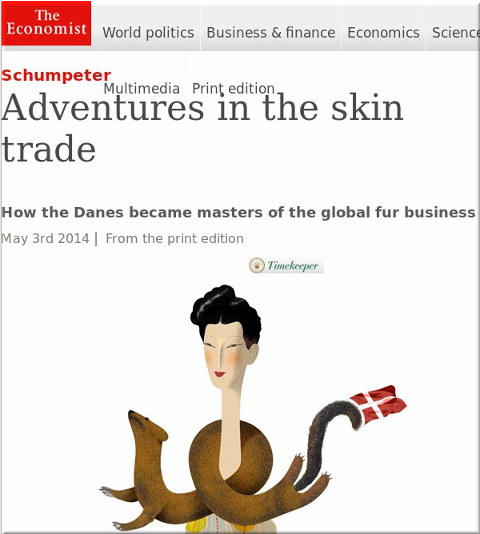
In May 2014 the Danish press reported that Kopenhagen Fur had made a “secret donation” of 70.000 DKK (approx. 9,400 Euro) to the Danish liberal party Venstre which did not appear in the party’s accounts.
“In May 2014 the Danish press reported that Kopenhagen Fur had made a “secret donation” of 70.000 DKK (approx. 9,400 Euro) to the Danish liberal party Venstre which did not appear in the party’s accounts.”Connections between the Danish fur industry and politics have also been explored in a recently published book entitled Skjulte penge (“Hidden money”) which was written by Chris Kjær Jessen and Carl Emil Arnfred, two investigative journalists from the leading Danish national daily newspaper Berlingske. The book Skjulte penge investigates “power, political parties and lobbying in Danish politics”. Amongst other things it examines the role of the fur industry and Kopenhagen Fur and the influence which it exerts in political circles.
Here is a picture of the book’s cover:
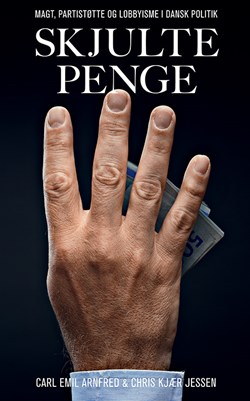
In an article entitled Kan minkavlere købe sig til politisk indflydelse? (“Can mink breeders buy political influence?”) published by Dagbladet Information in June 2016, the Danish journalist Morten Frisch referred to the book Skjulte penge and discussed some of the known links between Kopenhagen Fur and various Danish politicians including those from the Venstre party with which Kongstad is rumoured to have close associations.
This is the source of the caricature at the top.
The extent of the Kongstads’ connections to Kopenhagen Fur and the Danish Fur Breeders’ Association is at present still unclear and needs further research.
“Connections between the Danish fur industry and politics have also been explored in a recently published book entitled Skjulte penge (“Hidden money”) which was written by Chris Kjær Jessen and Carl Emil Arnfred, two investigative journalists from the leading Danish national daily newspaper Berlingske.”What is known, however, is that the Bremelandsgård fur farming operation receives coverage in the form of puff-pieces in Dansk Pelsdyravl (“Danish Fur Farming”) a bi-monthly trade magazine published by the Danish Fur Breeders’ Association with a circulation of 4,000 copies.
Kopenhagen Fur which is owned and managed by the DFBA is also known to have given publicity on its Web site to fur farming events held at Bremelandsgård.
The most recent “open day” event took place on 17 September 2016 as reported on the Kopehagen Fur Web site.
“Kopenhagen Fur which is owned and managed by the DFBA is also known to have given publicity on its Web site to fur farming events held at Bremelandsgård.”The Kongstads are members of the Agricultural Association of the Gribskov Chamber of Commerce (Erhverv Gribskov Landbrugsforening) and are known to be active in local fur breeding circles. Majbritt Kongstad is listed as a member of the executive committee and current treasurer of the Zealand Chinchilla Association (Sjællands Chinchillaforening).
Committee meetings of the Zealand Chinchilla Association regularly take place at the Kongstad farmstead.
The annual committee meeting for 2015 was held at Bremelandsgård on Saturday 30 May 2015 as can be seen from an invitation sent to the committee members [PDF].
Some people have pointed out that Kongstad’s involvement in the fur farming business could potentially involve him in conflicts of interest.
One reason given for this is that as Director General of the DKPTO he is responsible for administrative decisions relating to intellectual property rights, including trademarks, in Denmark.
“Committee meetings of the Zealand Chinchilla Association regularly take place at the Kongstad farmstead.”As can be seen from the publicly accessible online database of the DKPTO, the Danish Fur Breeders’ Association has quite a number of registered trademarks assigned under its official Danish name Dansk Pelsdyravlerforening.
The most recently registered trademark assigned to the DFBA is “KOPENHAGEN FUR INVEST” which apparently refers to a publicly traded investment fund associated with Kopenhagen Fur.
It has also been suggested that Kongstad’s involvement in commercial fur farming could raise other awkward questions due to the fact that fur farming is banned or strictly regulated in many European countries and highly controversial in others because of ethical and/or animal welfare concerns. See this page for details.
“Some people have pointed out that Kongstad’s involvement in the fur farming business could potentially involve him in conflicts of interest.”Although chinchilla fur farming is currently perfectly legal in Denmark, some people have begun to wonder whether the involvement of the Director General of the DKPTO in such an enterprise would be compatible with the “dignity requirement” applicable to Danish civil servants under § 10 of the Danish Civil Servants Act:
“Officials must conscientiously abide by the rules that apply to their position, and both within and outside the service prove worthy of the esteem and trust that the position requires.”
For the moment these are open questions but it seems that Kongstad’s connections to the Danish fur industry and in particular to Kopenhagen Fur deserve further investigation. █
Permalink
 Send this to a friend
Send this to a friend
10.11.16
Posted in Europe, Patents at 8:31 pm by Dr. Roy Schestowitz
The effect of the EPO’s SLAPP-happy lawyers in London or FTI Consulting’s branch in London? (or both, or maybe just good old entryism)

Summary: Criticism of the EPO has become harder to find not because people have come to accept the EPO’s management but because there’s a censorship campaign and people are growingly afraid to speak
FEWER and fewer publications nowadays cover EPO scandals, for reasons we attempted to explain some days ago. SUEPO too hardly publishes anything. The other day we mentioned censorship at IPKat (or IP Kat) — an issue we had been writing about for a while now, especially in recent months.
“Very mysterious things [are] going on at the IPKat recently,” this one comment said this week. To quote in full: “Good to see that my comment submitted on 10/06/16 at around 11:30 CEST and again on 10/07/16, 10:41 CEST has now finally been published. Remarkable, however, is the alleged publication date and time of 10/07/16, 9:42 BST. It was not published (yet) when I looked for it on 10/08/16 and in the morning of 10/09/2016; I first saw it this morning (10/10/16). Has the publication date/time been backdated and if so, why? And what happened to the first comment filed on 10/06/16?
“Apparently — and over time it seems ever more plausible — there is just an attempt by the EPO’s management to cause media blackout and information lockdown, not just by shutting down critical media (or critical elements within it) but also scaring EPO staff.”“Very mysterious things going on at the IPKat recently.”
A reply like “Yours is not to question why, yours but to grant or reject” (sounds like pro-management slant) was posted in reply to “We have even been urged not to discuss among ourselves or with our union committee(s)…”
Apparently — and over time it seems ever more plausible — there is just an attempt by the EPO’s management to cause media blackout and information lockdown, not just by shutting down critical media (or critical elements within it) but also scaring EPO staff. Self-censorship is an incredibly powerful weapon they have attempted to use even against non-profits. Regarding IP Kat, not a single EPO-hostile article has appeared there since the one-day censorship by the EPO. IP Kat is not responding to my queries about this.
“New rumour [is] circulating at the EPO,” said this new comment, showing that rumours get around whether the management likes it or not. Laughably enough, it’s believed that Battistelli’s bulldog is being considered for the job of managing the boards of appeal (which Battistelli cannot help bullying). If true, that would be a new low for the EPO and for the independence of the boards. “It is being whispered in the corridors of the EPO Isar building,” wrote this person, “that VP4 has applied for the job as President of the Boards of Appeal citing his vast experience in litigation matters and his extensive knowledge of court procedures including appeals.”
Is it also being whispered in the corridors of the EPO Isar building that he faces many criminal charges in Croatia? Does that count as experience in litigation matters? These boards, one might add, face risk of getting replaced by UPC courts. Battistelli promotes the UPC like it’s his sole baby and he keeps demolishing the boards by all means possible. He just can’t help himself. It has gotten so bad that it’s difficult for outsiders to believe and the media hardly covers the matter. Watch what IP Kat has turned into; it’s like a textbook example of vendor captive/capture. As we put it recently, "IP Kat is Lobbying Heavily for the UPC, Courtesy of Team UPC" (notably Bristows, which continues to stomp on EU citizens by UPC lobbying).
“Laughably enough, it’s believed that Battistelli’s bulldog is being considered for the job of managing the boards of appeal (which Battistelli cannot help bullying).”The latest from Bristows says that “In a press release (here) on 7 October 2016, the Italian Ministry of Justice announced that the Unified Patent Court (UPC) in Milan will be located in an existing court building at via San Barnaba 50.”
They just refuse to give up and they are willing to mislead even politicians. “UPC, Brexit and swpats are on the agenda of next 22nd November,” Benjamin Henrion wrote the other day. “I give you the benefit of doubt.”
Red Hat’s Jan Wildeboer said he was “Thinking of returning to Brussels a bit more often. Lobbying for Open the @hintjens way is needed. Be very afraid :-)”
“Sadly, and not to suggest that it was ever not the case, IP Kat spends a lot of time advocating/promoting the UPC, occasionally software patents, and apparently it now suppresses or self-censors particular EPO criticism.”Wildeboer speaks about software patents, which he campaigned against a decade ago. UPC threatens to bring this curse back in a very big way. See the entire thread in [1, 2] to witness who’s pulling the strings. “Of course,” Dr. Stefane Fermigier wrote to Henrion about proponents of software patents, “but then they shouldn’t pretend they are working for the common good.”
Sadly, and not to suggest that it was ever not the case, IP Kat spends a lot of time advocating/promoting the UPC, occasionally propping up software patents, and apparently it now suppresses or self-censors particular EPO criticism. █
Permalink
 Send this to a friend
Send this to a friend
Posted in Deception, Europe, Patents at 6:52 pm by Dr. Roy Schestowitz
The sorts of pictures that Battistelli doesn’t want the delegates to see ahead of tomorrow’s meeting…
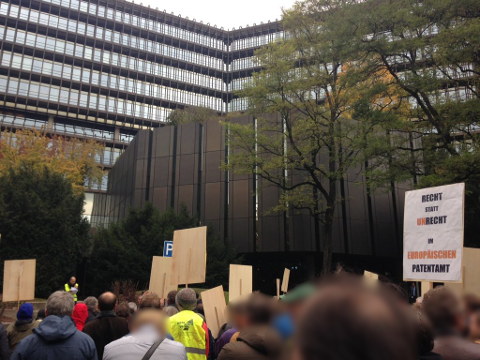
Summary: The EPO’s so-called ‘Social Conference’ (prepackaged, commissioned and paid-for bundle of lies) took place today, but staff was outside protesting against this Orwellian charade from President Benoît Battistelli
THE very many scandals at the EPO (all of them the management’s fault) have led staff of the EPO to to taking the great risk of going out, leaving their office to protest against the management at lunchtime. Personal sacrifices are plenty; these people aren’t the selfish/overpaid/cushy job/spoiled types which pro-Battistelli media tries to portray them as. They are loyal to fellow workers, not (just, if at all) to autocrats who manage them and do a great disservice to Europe with their horrible policies. Techrights has enormous respect for examiners who support their representatives and are willing to ruin their work security, personal safety, health etc. just to do the right thing. We cannot stress strongly enough that collective punishment isn’t of merit here because many examiners have served the Office since long before Battistelli arrived at the scene and brought his cronies. We all want to save the EPO, not destroy it. It’s Battistelli who is destroying the Office.
“We all want to save the EPO, not destroy it. It’s Battistelli who is destroying the Office.”Shown above is Ion Brumme (dismissed by Battistelli earlier this year). He was speaking at today’s SUEPO demonstration, which took place directly under the room where the EPO Social Conference was taking place (this photo is from today by the way).
Clever move there from SUEPO. Did it help highlight the great degree of injustice that this entire Social Conference was? SUEPO was denied access so that Battistelli can lie unchallenged. He was ‘grooming’ people ahead of tomorrow’s meeting. He wants to avoid/dodge accountability for social injustice at the Office. He wants demands from March to simply vanish as though they never existed.
As one person put it in comments the other day:
that is no real wonder.
Internally only the last two weeks things started happening.
We live in a cycle of 3 months, which is dictated by the four meetings of the AC every year.
Management tables their proposals as late as possible, to deny everyone a possibility to fully read all the papers and make an informed opinion, thus eliminating any possibility for positive feedback (this became an obvious tactic under Miss Brimelow) and staff has learnt to wait for the proposals to be on the table instead of guessing what might come.
The fight for PR has already started on management side, the staff has a bit more difficulty with that, as it has less money available for that, and is not allowed to discuss anything our management considers to be internal matters anywhere. We have even been urged not to discuss among ourselves or with our union committee(s)…
“It’s a total disgrace and it makes it abundantly clear that the Administrative Council no longer does its job.”One day, time permitting, we might get around to revisiting the demands from March and what exactly happened to them back in June. It’s a total disgrace and it makes it abundantly clear that the Administrative Council no longer does its job.
Earlier today we mentioned an open letter to the Delegations of the EPO's Administrative Council. It relates to the change proposal for new WIPO Investigation Guidelines (see the WIPO Investigation Guidelines proposal from 3 weeks ago [PDF]) and this was covered earlier today by IP Watch, a site that closely follows WIPO — more so than it follows the calamity at the EPO. Here are portions of what it published:
The Administrative Council (AC), made up of members of the EPO member states, meets 12-13 October in Munich. In an 11 October letter to the council, the EPO-FLIER team, which identifies itself as a “group of concerned staff” who wish to remain anonymous “due to the prevailing harsh social climate and absence of rule of law” at the office, blasted President Benoît Battistelli’s proposed new disciplinary and investigation guidelines and urged governments instead to consider a WIPO proposal (available here).
Battistelli’s new guidelines, if approved, would allow the president to dismiss staff members for “professional incompetence” without any meaningful advisory review, and would also permit the administration to investigate and discipline employees without due process, the EPO-FLIER letter said. It asked AC members to consider WIPO’s recently proposed investigation guidelines, saying that while WIPO has “immense problems in its staff relations,” it seems to have floated a balanced proposal that includes an independent investigative unit, due process guarantees and whistle-blower protections.
A summary of conclusions from the 22 September AC Board meeting noted that the German delegation “was unhappy with President’s change proposal for the Investigation Guidelines CA/52/16 Rev. 1 … so that ‘no common understanding could be reached on the right to be silent and on other issues. The President had strong reservations on this issue, insisting on the necessity to ensure an efficient procedure to fight fraud and harassment, and reserved the possibility to withdraw the package from the agenda.’”
[...]
In a 12 February 2016 letter, made public on 29 September by techrights.org (available here), http://techrights.org/2016/09/29/netherlands-institute-of-patent-attorneys-on-battistelli/ the president of the 500-member Dutch Institute of Patent Attorneys (Nederlandse Orde van Octrooigemachtigden) told the AC that while the Orde applauds EPO efforts to set worldwide standards in patent quality and efficiency, it “has to express its serious and on-going concern” about the way in which the office’s reinvention process is happening and the “effects that it has on the image of the EPO.” Specifically, the letter said, patent lawyers are worried about developments regarding the organisation and government of the Boards of Appeals and the treatment of EPO personnel.
The Orde observed that employment conditions at the office and the basic rights of employees are “seriously compromised.” In the beginning, staff opposition seemed to be a common and understandable reaction to changes every organisation experiences, but over time the information that reached the public became more and more serious, with union officials subjected to disciplinary measures and downgraded, pension reductions and firings, the organisation said.
“It seems that the people at the EPO are afraid of their own management,” the Orde said. “We sincerely believe that the current situation at the EPO has spun out of control by the actions of its President,” and that the AC should stop Battistelli from “continuing these unproductive and destructive practices,” it said.
The current climate holds negative consequences for the future of the European patent, EPO-FLIER said. The estimated 2016 over 2014 increase in production (up 23 percent) and productivity (up 11 percent) “is not a sign of successful reforms but rather proves that the examiners have lost any ambition to withstand unrealistic and arbitrary production targets imposed on them by the Administration” – to the detriment of patent quality.
Publications in Battistelli's pocket have said nothing about it and relative quiet/calm/apathy in the media is what we predicted several days ago, due to threats and money awards from Battistelli to the media. It’s nice to see IP Watch returning to EPO coverage and we hope to see more of that in the future.
There was also a new article today in the French media, focusing on the social situation not at WIPO but at the EPO (Battistelli — it’s worth repeating — tried to become WIPO’s head). Hopefully a SUEPO-provided translation of this French article about the EPO is imminent; several people told us about it today and SUEPO too linked to it. Do we have any volunteers for translation?
“It’s nice to see IP Watch returning to EPO coverage and we hope to see more of that in the future.”As for the EPO, it has said nothing at all (publicly at least) about the Social Conference. Not even a tweet about it! Nothing about the Friday release of the so-called 'social' 'study', either. Maybe they just want to keep it all covert/internal so as to avoid outside scrutiny, criticism, or independent assessment. They know it’s junk/pseudo-science and propaganda that wouldn’t carry water. The EPO chose quite some timing for useless PPH distraction (warning: epo.org link), having just published this nonsense today and repeatedly warned people about a deadline for participation in Battistelli's next public lobbying event. Getting desperate there, eh? Maybe because people don’t play along with the stunt/lobbying this time around? They have 'spammed' nearly 50 universities across Europe about it, but these universities hardly reciprocated. One of these latest calls of misery says: “Tomorrow is the last day! If you know a researcher who has invented something amazing, nominate them now…”
Another one says: “Nominations close in about 24 hours. Who should win next year’s European Inventor Award?”
Elizabeth Holmes, definitely! Give her another chance. She had the same level of integrity as the President of the EPO. █
Permalink
 Send this to a friend
Send this to a friend
10.10.16
Posted in Europe, Patents at 8:19 pm by Dr. Roy Schestowitz
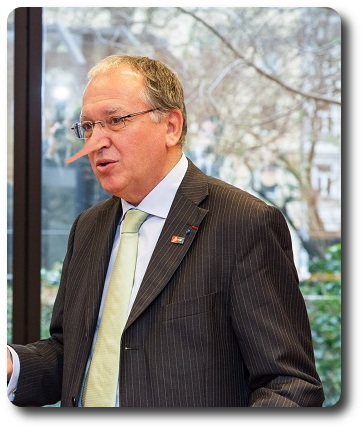
Source (original): Rospatent
Summary: A concise new letter explains the situation at the EPO and what Battistelli is planning to do next, especially if the Administrative Council gives him a carte blanche, as usual
THE heads of the delegation of the Administrative Council of the EPO are about to meet and the following letter is being sent to them from staff that, as a matter of survival, must remain anonymous. Below is the content of the letter:
Open letter – by email to the Heads of Delegation
11 October 2016
Copies to:
Competent Ministries of the Member States
The social situation at the EPO and the Administrative Council’s responsibility
Dear heads and members of the delegations to the Administrative Council of the European Patent Organisation, dear Chairman, dear Mr Grandjean,
We would like to share our concerns about the current social climate at the EPO and urge you to take appropriate action.
‘Social Conference’ – how to avoid social dialogue
You will probably agree that in any organisation the first step towards genuine dialogue is to work towards a shared understanding of the problems at hand and of the long term goals, in other words, to share an agreed agenda. This seems a reasonably evident requirement for the future success of the EPO. Sadly, the Office missed a chance to take a first step towards this, when it alone set the agenda of the ‘Social Conference’ scheduled for 11 October. Consultants will present a ‘social study’1 while the President refuses to discuss the results of a staff survey2 commissioned by the EPO’s largest staff union. It is difficult to imagine how even the seeds of social dialogue can exist while the Office continues with its unilateral approach to the most multilateral of issues. The President’s threats to and persecution of elected representatives3 of his social partner only serve to shift the situation from bad to worse. Through his actions he makes social dialogue impossible. For staff across the Office, the ‘Social Conference’ can only be seen as just another useless attempt to mould a distorted perception of the reality at the EPO. And to avoid true social dialogue.
The social situation at the EPO – a matter of perception?
You may already have seen a letter of the President of the Dutch Institute of Patent Attorneys, ‘Nederlandse Orde van Octrooigemachtigden’ (Orde)4, dated 12 February 2016 and addressed to the Council, which recently became public5. The Orde perceives the social climate in the Office as follows:
‘… We note that, when we seek information from EPO employees, they are reluctant to communicate in fear of retribution by internal investigative units. It seems that the people at the EPO are afraid of their own management. The Orde rejects this situation vehemently. We cannot understand that the President of an organization that envisages to “set worldwide standards in quality and efficiency“ is not capable or not willing to apply the same standards to its people management. We refer also to the ruling of the Dutch Appeal Court that the EPO appears to be violating basic human rights.
A disgrace, irrespective whether the EPO benefits from its immunity as an international organisation or not. A reputable international organization such as EPO should not have it’s employment conditions and employee rights held up against such a basic thing as human rights.’
Consequences of the current social climate for the future of the European patent
It is illusory to think that a human resources policy without any negotiation, founded on intimidation and the non-respect of fundamental rights can bind highly skilled staff to the Organisation. The Orde is right to use the word “disgrace” to describe any violation of human rights that takes place at the EPO. No amount of immunity can diminish that disgrace. Disengaged and demotivated employees will clearly not be able to examine patent applications with the critical focused mind needed for delivering a legally valid monopoly right. We cannot imagine that the delegations to the Administrative Council still believe that it will be possible to maintain a successful European patent and foster economic growth without the active support of staff. We certainly don’t.
An estimated6 2016/2014 increase in production (+ 23%) and productivity (+11%) is not a sign of successful reforms but rather proves that the examiners have lost any ambition to withstand unrealistic and arbitrary production targets imposed on them by the Administration. The current management style has destroyed staff’s professional attitude and pride to work for an organisation whose aim is, or at least was, to support economic growth by delivering high quality patents. It is our view that the European Patent Organisation finds itself in the deepest crisis7 of its history.
The currently planned reforms, if adopted, would aggravate the crisis
If proposal CA/53/16 Rev. 1 (reviewed Disciplinary Guidelines) gets approval, Mr Battistelli will be in a position to dismiss staff members for ‘professional incompetence’ without any meaningful advisory review instance. He will be able to expose EPO employees to unemployment without the safety net of a social security system. For fear of dismissal, staff will no doubt do their best to deliver another productivity increase. The quality of search reports and the legal validity of European patents will drop further.
By adopting the reviewed Investigation Guidelines (CA/52/16 Rev. 1) the Council would authorise the Administration, i.e. Mr Battistelli, Mr Topić and Ms Bergot, to proceed with investigative and disciplinary proceedings in a way that is in contradiction to the principles of due legal process. Before adopting any revised proposal, we ask the delegations to consider the recent proposal for WIPO’s new Investigation Guidelines8. WIPO has immense problems in its staff relations. But in this case, they seem to have put forward a balanced proposal, at least on first inspection. It takes account of lessons learned9, provides an independent investigative unit, and guarantees due process and whistle-blower protection, including the case of investigations against senior officials10.
Please do not support the current proposals CA/52/16 Rev. 1 and CA/53/16 Rev. 1. There can be no doubt that they give new tools of abuse to those at high level who wish to use them, and increase the risk of victimisation, harassment and miscarriages of justice in a system that is already under fire for not fulfilling the requirements of legal process.
Staff protest against the treatment of their elected representatives by the President and the passive attitude of the Board 28 vis-à-vis this issue in its recent meeting3. We kindly ask all delegations to remember the AC’s resolution 11 of this March and to take the steps that must follow it:
“to ensure that disciplinary sanctions and proceedings are not only fair but also seen to be so, and to consider the possibility of involvement of an external reviewer or of arbitration or mediation
pending the outcome of this process and before further decisions in disciplinary cases are taken, to inform the AC in appropriate detail and make proposals that enhance confidence in fair and reasonable proceedings and sanctions;”
We further plead that matters of such grave concern no longer be discussed in closed session. Arguments put forward need to be visible to the affected parties, being staff and applicant community.
With our best regards,
The EPO-FLIER team
a group of concerned staff of the EPO who wish to remain anonymous
due to the prevailing harsh social climate and absence of rule of law at the European Patent Office
_________
1 European Patent Office – Social Study 2016, by PwC
2 https://www.suepo.org/results_of_the_2016_european_patent_office_staff_survey/d-43311
3 B28/10/16 (21.09.2016): “the Board noted information provided by the President about three current investigations/disciplinary proceedings involving SUEPO members in The Hague”
4The Dutch Institute of Patent Attorneys is the professional organisation of Dutch patent attorneys; its about 500 members are active in private practice and in industry, most of them are also European Patent Attorneys
5 http://techrights.org/2016/09/29/netherlands-institute-of-patent-attorneys-on-battistelli/
6 http://techrights.org/wp-content/uploads/2016/09/sc16170cp.pdf
7 B28/2/16 (02.02.2016): “The Board qualified the situation as a crisis – a view challenged by the President.”
8 http://www.wipo.int/edocs/mdocs/govbody/en/wo_ga_48/wo_ga_48_16.pdf
9 http://www.ip-watch.org/2016/09/30/gurry-speaks-on-allegations-for-first-time-as-wipo-members-discussion-actions
10 http://www.ip-watch.org/2016/10/10/members-debate-changes-to-oversight-at-wipo/
11 http://www.epo.org/about-us/organisation/communiques.html#a23
I have taken two day off work this week. We can hopefully provide coverage of what happens as the media sure isn’t doing its job. We more or less know why. █
Permalink
 Send this to a friend
Send this to a friend
Posted in Europe, Humour, Patents at 7:46 pm by Dr. Roy Schestowitz
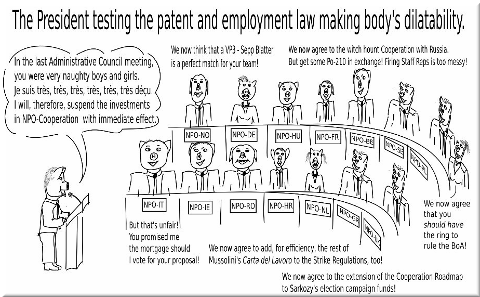
Large version
Summary: The latest cartoon poking fun at the current situation at the EPO
Permalink
 Send this to a friend
Send this to a friend
10.09.16
Posted in Asia, Europe, Patents at 5:24 pm by Dr. Roy Schestowitz
Poor quality patents (SIPO) and lack of examination (INPI)
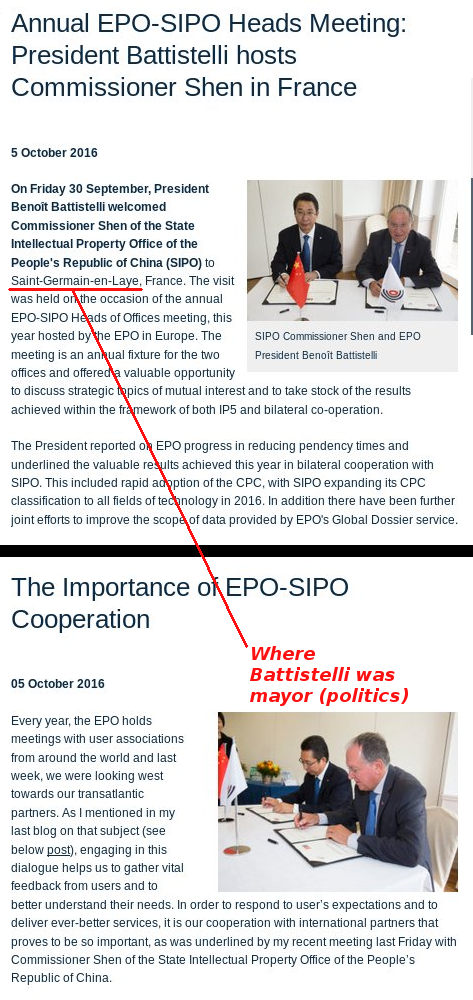
Summary: The trajectory of the EPO under Battistelli’s leadership gives cause for very serious concerns, which include patent trolling and a humongous disservice to existing grantees of EPs (European Patents)
THE EPO may be going down the road of both China's SIPO and France's INPI (where Battistelli and many of his cronies at today's EPO top-level management came from). The Chinese have remarkably low patent quality (quantity over quality is the mantra) and the French, who fail to attract applications (French is spoken by far fewer people than Mandarin speakers), hardly care about quality at all. A French INPI clerk just rubberstamps (or simply files/shelves) everything that comes in. If the EPO follows the French model, then no examiners will be needed, just clerks who can follow a simple manual. How would one feel about one’s old/er EP/s if every crappy application on the EPO’s pile was suddenly granted or at least given hasty consideration for the sake of so-called ‘production’? Battistelli’s policy poisons the well or muddies the water right now. It is unfair to people who spent a fortune (and many years) pursuing EPs.
“If the EPO follows the French model, then no examiners will be needed, just clerks who can follow a simple manual.”As we noted here several weeks ago, east Asia is becoming attractive to patent trolls [1, 2], due in part to low patent quality (same as was the case in the US). There are more trolls and litigation, not just poor patent quality; there’s a correlation between those two things. SIPO is by far the worst in that regard. Korea and Japan, in the mean time, recognise the self-destructive nature of M.A.D. with patents, based on another article from IAM that says: “This blog has noted that one of the big themes in Asia’s automaking industry this year has been a significant move by Japanese and Korean brands to join defensive patent alliances. It’s a strategic shift for the industry that in many ways is being led by companies in this part of the world, rather than their North American and European counterparts. But Chinese companies have not yet followed the same path in significant numbers, and industry observers say with litigation on the rise there, buy-in from players in China will be crucial for these alliances going forward.”
One or two of IAM’s paid (partly by patent trolls) writers have focused a lot on Asia recently. See the latest issue’s “Patents in Asia 2016″ series, including focus on China, Japan, South Korea, and Malaysia. The feature item was actually about China, titled “Putting China’s patent rise into context” (all behind a paywall) and Jacob later wrote (partly in relation to this) that China welcomes crappy patent applications from the US, just like the EPO under Battistelli does. He recently started following me in Twitter (maybe out of curiosity, I find him a lot more balanced than Mr. Lloyd and Mr. Wild) and he didn’t put it in these words but instead he wrote:
It was eye-opening, but not necessarily shocking, to read on this blog last Tuesday the suggestion that Huawei’s mobile patents might generate up to 20% of all the patent income earned by Chinese companies. The conjecture appeared in a new research paper which seeks to revise (downward) earlier estimates of the total royalty stack on the typical mobile phone. The study looked at 49 major mobile licensors, of which Huawei was one of only two Asian operating companies (the other being Samsung Electronics).
Credit the Shenzhen-based company for building an IP team that has put it head and shoulders above its domestic competitors in terms of patent portfolio strength. I was reminded, though, of a quote by Huawei head of IP Jason Ding that appears in the issue of IAM out this week…
There is also an article about Foxconn.
Asian companies haven’t much to gain from a crappy patent system. Take Samsung for example. The most stupid patent that has made headlines in recent years (slide-to-unlock, hardly a novel concept at all) might soon cost Samsung more than $0.1 billion, based on reports like this new one and some remarks from Florian Müller (he wrote a lot more about it in Twitter). To quote Bloomberg (cited by Slashdot):
Apple Inc. won an appeals court ruling that reinstates a patent-infringement verdict it won against Samsung Electronics Co., including for its slide-to-unlock feature for smartphones and tablets.
In an 8-3 ruling, the U.S. Court of Appeals for the Federal Circuit said a three-judge panel was wrong to throw out the $119.6 million verdict in February. Instead, it ordered the trial judge to consider whether the judgment should be increased based on any intentional infringement by Samsung.
Does this not demonstrate how foolish software patents harm companies like Samsung, whose home country (Korea) does not permit software patenting (we wrote about this earlier in the month)? This new IAM article remarks on patent tax when it comes to phones, which makes them very expensive (“licensing return from mobile market at $14.3 billion”).
As for the patent system in France, where does one even begin? The patent system in France is worse than a bloody joke; one might even call it a facility for corruption in light of details about the Patent Boxes (we wrote about this too, several times in the recent past alone). Here is a new article about it, demonstrating that journalists have begun catching up with the dirty scheme:
France’s patent box legislation, which permits a 15 percent corporate tax rate for profits from licensing of intellectual property rights rather than the usual 35 percent corporate tax rate, is being challenged as unfair to the European Union single market.
The matter has come before the EU Code of Conduct Group for Business Taxation, where several EU countries—including Ireland, Bulgaria and the Baltic nations— are insisting the French patent box regime should be considered harmful.
Among those contesting France’s IP rate are EU member countries that were themselves previously criticized by France over their overall low corporate tax rates.
“The issue has surfaced because France insists its regime doesn’t need to be reformed as all EU member states agreed to do in 2014,” a European Union diplomat, who participates in the Code of Conduct Group of Business Taxation, told Bloomberg BNA Sept. 30.
“However, all other EU countries are reforming their tax regime and insist France must do the same. Some of these countries, many of them resentful over French criticism of tax dumping, are rejecting the French arguments against reform.”
In this new IAM article a connection between the French and the Chinese is highlighted, in the form of “France Brevets”:
Unlike IP Bridge and Intellectual Discovery, France Brevets did not provide comment for the feature, but anecdotal accounts suggest that there has been something of a shift in strategic focus at the firm in recent months – and the call for change has come from the highest levels.
It appears that securing a return on its 100% public sector investment is now the fund’s primary objective, with its aims of boosting the domestic SME sector and kickstarting a local market in IP assets taking a back seat, at least for the time being. Simultaneously, some key personnel have come and gone; in June, founding CEO Jean-Charles Hourcade was replaced by Didier Patry, who was previously head of IP at Eaton Aerospace and before that led Hewlett-Packard’s IP transactions department from 2002 to 2014. Pascal Asselot, who had served as the fund’s director of development and licensing since its establishment, departed in the same month.
The USPTO, which finally tightens patent scope and goes after trolls (more on that in articles tonight and tomorrow), isn’t the world’s worst; some of the worst are probably SIPO and INPI and this is what the EPO is connecting to (several days ago Battistelli bragged about meeting SIPO officials in the town where he used to be a mayor, over in France that's not even an EPO host nation). █
Permalink
 Send this to a friend
Send this to a friend
Posted in Europe, Patents at 3:41 pm by Dr. Roy Schestowitz
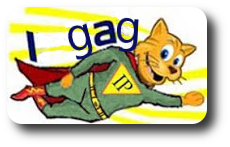
Summary: Suspicions that the popular blog IP Kat is suppressing criticism of the UPC are being aired, belatedly, over at IP Kat, hinting at the possibility of self-censorship due to financial motivations rather than fear of the EPO’s legal bullying, or strategic lawsuit against public participation (SLAPP)
THE EPO, as we last noted this afternoon, is trying to control not only media companies but also blogs, staff, and any other means of communication. The Office wants media blackout and information lockdown. Nobody but the chronic liar (Battistelli or cronies like Margot Fröhlinger) is allowed to have a voice. AMBA, for example, is too afraid/reluctant to even respond to E-mails from Managing IP. This is basically the current strategy of the EPO and in a sense it’s both clever and effective. That’s why North Korea and Iran adopted it.
Remember the times when IP Kat was a go-to place and a critical voice regarding the EPO? That was quite a while back. They write nothing about the subject anymore, so I asked them about it online. I am still waiting for an answer.
Several interesting (but old) comments were published at IP Kat shortly after we had noted something about IP Kat not publishing particular comments (we wrote about it in the afternoon), though the timing is quite possibly a coincidence, so we’re not suggesting that they did this in response to something we had written.
Here is what one comment asked: “Dear team of IPkat, I haven’t seen a post about the situation at the EPO since a couple of months. How come? Do you think there are no news? Have you been threatened? 3 staff rep in The Hague are being under investigation at the moment. Staff is planning demo next week. How come you do not report about it?”
No response since. I too asked them and have not received a response. “Has IP Kat been threatened — not just censored — by the EPO,” I asked IP Kat and its founder. “Given the circumstances, no reply might be “yes”,” I added.
Remember that IP Kat already received threats from other such bodies, as did a few other bloggers (not even big publishers and paid journalists).
Nowadays it feels like IP Kat writers, not wanting to have particular things mentioned, simply suppress particular things (censorship and also self-censorship). Some believe it’s done for fear that the EPO would censor them again (or maybe even send threatening letters as they did to me). Some bloggers did humorously insinuate that IP Kat was next on the EPO’s naughty list. First they were added to the censorship list (after they had done this to me), so is a threat of lawsuit next in line? Just the thought itself would be enough to gag (self-censor) IP Kat. It’s known as the Chilling Effect and next week — not fearing retaliation — we shall write about the chinchilla effect.
Here is a comment about alleged criminals at the top of the EPO. The EPO simply chooses call those who mention charges against them “defamation”. Here is the comment which is days old and IP Kat has not published until a relatively short while ago (I see publication time through my RSS feeds):
To further reinforce the narrative about defamation, VP3 sued the member of the board of appeal for in a German court – you may have read the outcome above (28/09): it appears that the Procurator dismissed the case recently.
Actually it was VP4 who tried to file a lawsuit in Germany.
His litigation track record is not so hot.
In January 2015 he apparently lost a defamation lawsuit in his home country:
http://techrights.org/2015/03/18/full-judgment-against-topic/
Now it seems that the German Procurator didn’t even consider it worthwhile opening proceedings against the person accused of defamation.
But don’t worry he still enjoys the favour of the Lord Protector of Eponia.
“Well,” the person later added. “my last comment about VP4 seems to have been suppressed.”
This comment too was suppressed (no way it was detected/identified as spam), so it looks like IP Kat hoped nobody would notice what had happened. I was already told, since almost a year ago by multiple people, that IP Kat had been deleting (not publishing is the equivalent of that) their comments. They deleted mine too. See this example and also this one (later they blamed the latter on spam filtering, but the former they just simply deleted).
For IP Kat to suppress discussions about EPO’s scandals is a lot easier these days; now the blog just no longer writes anything on the topic (hence every comment would be off topic); the only comments about it (if published at all) are clustered in some very distant page from 4 months ago. “I think it is still possible to post,” one person wrote, but there’s no guarantee that what gets posted will in fact be published. Well, maybe it depends on what it’s about. Selective publication of comments is a form of censorship, by definition (I have been reading and writing about the subject of censorship for several years, so I am very familiar with the methods).
One person asked “Has the thread reached its limit” and “It seems so” was the response, until IP Kat suddenly published half a dozen comments in this thread alone (in the mean time it did publish numerous other comments, every day in fact, so being absent from moderation is not a valid excuse).
Please note, based on the above, that there are no offensive words in there or anything that should invoke a spam filter (potential excuse in these cases). There are no clickable links, either.
Another new comment, this one regarding the UPC which the blog habitually promotes/markets, says the site “seems to be so highly unwilling to put information like this in the public domain” because it’s against the UPC. The thread touches on (promotes) the UPC, so the comment is relevant, it’s definitely on topic, and it refutes the original propaganda from the Bristows employee by stating:
This is my second attempt to get this comment posted, after the first one made on 10/06/16 at around 11:30 a.m. CEST still remains to be published, despite its receipt having been confirmed.
To the commentators on 10/04/16, 21:13 and on 10/05/16, 8:30:
Don´t forget to mention Mr Haft who is also a member of said committee of the German Bar Association. His firm Hoyng ROKH Monegier was created just recently by a Dutch and a German firm joining forces in joyful anticipation of the UPC. Should the UPC now not become a reality, this may well consitute a delicate situation for them… It is vested interests like these that bring about desperate suggestions such as going ahead with the UPC at any cost and even without a crucial participant like the UK.
It is left to the imagination of the readers why the IPKat (and more specifically the author of this post) seems to be so highly unwilling to put information like this in the public domain, apparently going so far as to even censor respective comments.
These conflicts of interest in the collusion behind UPC 'experts' were previously noted in relation to Tilmann, whom we mentioned here before in [1, 2, 3, 4, 5]. This seems to suggest that the IP Kat blog not only censors criticism of the EPO but not also expands its suppression of comments to the UPC (although evidence is too scarce at this stage).
If IP Kat deleted (or did not publish) your comment/s, please get in touch with us so that we’ll know how broad the problem has become. If we are seeing selective coverage of particular sides depending on one’s agenda/goals/objectives/profit motive, then it is more severe than censorship and self-censorship for fear of SLAPP from the EPO.
For the record, Techrights accepted each and every one of the 33,583 comments posted over the years (zero censorship), including extremely rude and racist comments. That is what free speech means. █
Permalink
 Send this to a friend
Send this to a friend
« Previous Page — « Previous entries « Previous Page · Next Page » Next entries » — Next Page »




























 Content is available under CC-BY-SA
Content is available under CC-BY-SA